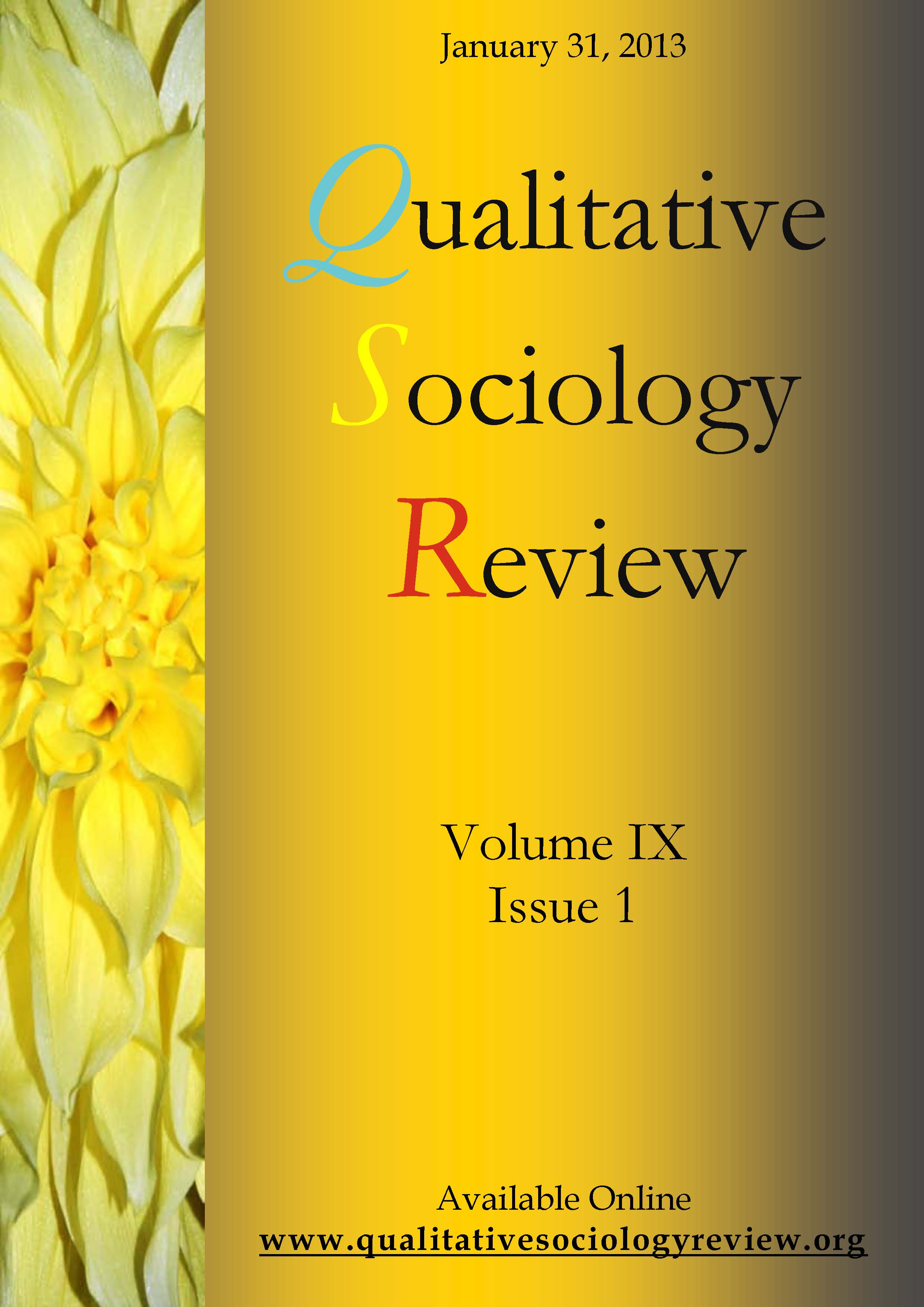How does it feel to be a problem? The Diasporic Identity of the Homeless
DOI:
https://doi.org/10.18778/1733-8077.09.1.04Keywords:
Homelessness, Capitalism, Culture, Identity, Inequality, PovertyAbstract
In this paper I uncover the identity response of the homeless to structural constraints that are facilitated through objectively produced and mass mediated culture. After an initial period of “liberation,” physical deprivation leads the homeless to seek institutionalized help. The “homeless” category constructed by the shelter industry absolves the system of blame and obfuscates the systemic roots of homelessness. In their picking and dropping of identities, and negotiations of meaning without any referential space to root themselves in, the homeless reveal to us the cultural tragedy of the present that affects us all due to rapid social change inherent in advanced capitalism.
Downloads
References
Abrahamson, Mark. 1996. Urban Enclaves. New York: St. Martin’s Press.
Google Scholar
Arnold, Kathleen. 2004. Homelessness, Citizenship and Identity. Albany, NY: SUNY Press.
Google Scholar
Becker, Howard S. 1966. The Outsiders: Studies in the Sociology of Deviance. New York: Free Press.
Google Scholar
Bellah, Robert N. and Steven M. Tipton. 2006. The Robert Bellah Reader. Durham, NC: Duke University Press.
Google Scholar
DOI: https://doi.org/10.1515/9780822388135
Berger, Peter L. 1974. The Homeless Mind: Modernization and Consciousness. New York: Vintage Books.
Google Scholar
Boothman, Derek, (ed.). 1995. Antonio Gramsci: Further Selections from the Prison Notebooks. Minneapolis, MN: The University of Minnesota Press.
Google Scholar
Denzin, Norman K. 1989. Interpretive Interactionism. Newbury Park, CA: Sage Publications.
Google Scholar
DOI: https://doi.org/10.4135/9781412984584
Du Bois, William E. B. 1995. The Souls of Black Folk. New York: Signet Classics.
Google Scholar
Durkheim, Emile. 1997. Division of Labor in Society. New York: Free Press.
Google Scholar
Enloe, Cynthia. 1993. The Morning After: Sexual Politics at the End of the Cold War. Berkeley, CA: University of California Press.
Google Scholar
Goffman, Erving. 1963. Stigma: Notes on the Management of Spoiled Identity. New York: Simon and Schuster.
Google Scholar
Habermas, Jürgen. 1987. The Theory of Communicative Action. Boston, MA: Beacon Press.
Google Scholar
Hagedorn, John. 2007. Gangs in the Global City. Chicago, Il: University of Illinois Press.
Google Scholar
Herman, Edward S. and Noam Chomsky. 2002. Manufacturing Consent. New York: Pantheon Books.
Google Scholar
Järvinen, Margaretha. 2003.“Negotiating Strangerhood: Interviews with Homeless Immigrants in Copenhagen.” Acta Sociologica 46(3):215-230.
Google Scholar
DOI: https://doi.org/10.1177/00016993030463003
La Gory, Mark, Ferris J. Ritchey, and Jeff Mullis. 1990. “Depression among the Homeless.” Journal of Health and Social Behavior 31(1):87-102.
Google Scholar
DOI: https://doi.org/10.2307/2137047
Lee, Barrett A., David W. Lewis, and Susan Hinze Jones. 1992. “Are the Homeless to Blame? A Test of Two Theories.” The Sociological Quarterly 33(4):535-552.
Google Scholar
DOI: https://doi.org/10.1111/j.1533-8525.1992.tb00142.x
Lemert, Edwin M. 1951. Social Pathology. New York: McGraw Hill.
Google Scholar
Loseke, Donileen R. 2003. Thinking about Social Problems. New York: Aldine De Gruyter.
Google Scholar
Lyon-Callo, Vincent. 2004. Inequality, Poverty and Neoliberal Governance: Activist Ethnography in the Homeless Sheltering Industry. Toronto: Broadview Press.
Google Scholar
Mannheim, Karl. 1960. “Types of Rationality and Organized Insecurity.” Pp 65-98 in Images of Man, edited by C. Wright Mills. New York: Braziller.
Google Scholar
Marcuse, Herbert. 1991. One Dimensional Man: Studies in the Ideology of Advanced Industrial Societies. New York: Beacon Press.
Google Scholar
Marx, Karl and Friedrich Engels. 1848. The Communist Manifesto. Retrieved February 20, 2010 http://www.anu.edu.au/polsci/marx/classics/manifesto.html
Google Scholar
DOI: https://doi.org/10.1215/9780822392583-049
Mead, George Herbert. 1967. Mind, Self and Society: From the Standpoint of a Social Behaviorist. Chicago, Il: University of Chicago Press.
Google Scholar
DOI: https://doi.org/10.7208/chicago/9780226516608.001.0001
Mills, C. Wright. 1951. White Collar: The American Middle Classes. New York: Oxford University Press.
Google Scholar
Mills, C. Wright. 1956. The Power Elite. New York: Oxford University Press.
Google Scholar
DOI: https://doi.org/10.2307/1983710
Mills, C. Wright. 1959. The Sociological Imagination. New York: Oxford University Press.
Google Scholar
Mills, C. Wright and Hans Gerth. 1964. Character and Social Structure: The Psychology of Social Institutions. New York: Mariner Books.
Google Scholar
Mukherjee, Bharati. 1997. “American Dreamer.” Mother Jones Magazine, February, p. 32-35.
Google Scholar
Parsons, Talcott. 1951. The Social System. New York: Free Press.
Google Scholar
Pinder, Ruth. 1994. “Turning Points and Adaptations: One Man’s Journey into Chronic Homelessness.” Ethos 22(2):209-239.
Google Scholar
DOI: https://doi.org/10.1525/eth.1994.22.2.02a00040
Real, Michael. 1977. Mass Mediated Culture. Englewood Cliffs, NJ: Prentice Hall.
Google Scholar
Said, Edward. 1999. Out of Place: A Memoir. New York: Random House.
Google Scholar
Schneider, Anne and Helen Ingram, (eds.). 2005. Deserving and Entitled: Social Constructions and Public Policy. Albany, NY: SUNY Press.
Google Scholar
Shreiber, Maeera. 1998. “The End of Exile: Jewish Identity and its Diasporic Poetics.” PMLA 113(2):273-287.
Google Scholar
DOI: https://doi.org/10.2307/463365
Simmel, Georg. 1900. The Philosophy of Money. New York: Routledge.
Google Scholar
Simmel, Georg. 1908. The Stranger. Retrieved February 18, 2010 http://www.infoamerica.org/documentos_pdf/simmel01.pdf
Google Scholar
Snow, David and Leon Anderson. 1987. “Identity Work among the Homeless: The Verbal Construction and Avowal of Personal Identities.” The American Journal of Sociology 92(6):1336-1371.
Google Scholar
DOI: https://doi.org/10.1086/228668
Snow, David and Leon Anderson. 1993. Down on their Luck: A Study of Homeless Street People. Berkeley, CA: University of California Press.
Google Scholar
Stets, Jan E. and Alicia D. Cast. 2007. “Resources and Identity Verification from an Identity Theory Perspective.” Sociological Perspectives 50(4):517-543.
Google Scholar
DOI: https://doi.org/10.1525/sop.2007.50.4.517
Susser, Ida. 1996. “The Construction of Poverty and Homelessness in U.S. Cities.” Annual Review of Anthropology 25:411-435.
Google Scholar
DOI: https://doi.org/10.1146/annurev.anthro.25.1.411
Veblen, Thorstein. 1997. Absentee Ownership. Business Enterprise in Recent Times: The Case of America. New York: Transaction Publishers.
Google Scholar
Wasserman, Jason A. and Jeffrey M. Clair. 2010. At Home on the Street: People, Poverty, and a Hidden Culture of Homelessness.Boulder, CO: Lynne Rienner Publishers.
Google Scholar
West, Candace and Don H. Zimmerman. 1987. “Doing Gender.” Gender and Society 1(2):125-151.
Google Scholar
DOI: https://doi.org/10.1177/0891243287001002002
Downloads
Published
How to Cite
Issue
Section
License

This work is licensed under a Creative Commons Attribution-NonCommercial-NoDerivatives 4.0 International License.











